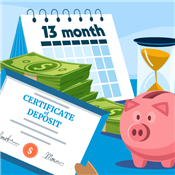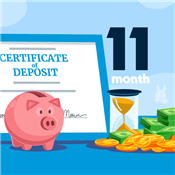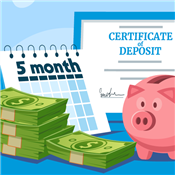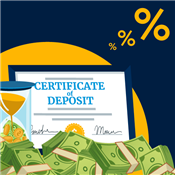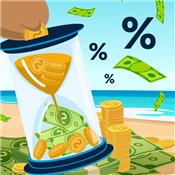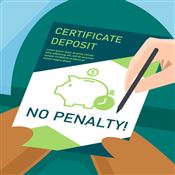CD Rates Calculator
Ad Disclosure: This article contains references to products from our partners. We may receive compensation if you apply or shop through links in our content. This compensation may impact how and where products appear on this site. You help support CreditDonkey by using our links.
How much interest will you earn on your CD? Enter a few details to calculate your APY and ending balance.
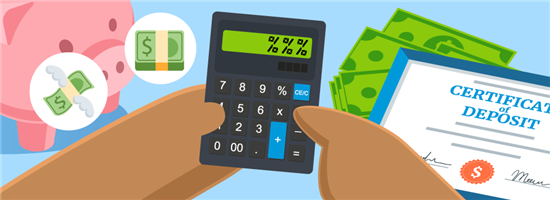 |
CDs are a conservative and secure way to earn a bit of interest on your savings.
But before you commit to this investment strategy, take a look at how it works and the benefits vs drawbacks.
- Western Alliance Bank:
High-Yield CD Rates - Up to 4.00% APY - CIT Bank No Penalty CD:
3.75% APY - Quontic:
CD Rates - Up to 3.75% APY - Raisin:
High-Yield CD - Up to $1,500 Bonus - Consumers Credit Union:
7-Month Super Jumbo CD - 4.05% APY - Bellco Credit Union:
6-Month CD - 3.90% APY
What is a certificate of deposit?
Certificates of deposit (CDs) keep your cash safe while earning a higher interest rate than a traditional savings account.
However, you must commit to keeping your money "locked up" for a set period of time to get the higher interest rate. Be aware that you could incur penalties and fees if you withdraw money early.
Pros:
- Higher yields than regular savings accounts
- Guaranteed rate of return
- CD laddering lets you add long-term stability to your portfolio
Cons:
- Early withdrawal penalties
- Money is not as liquid as savings accounts
- Yields might not beat inflation
- Today's interest rates are lower than the past's
- CIT Bank No Penalty CD:
3.75% APY - Raisin:
No-Penalty CD - Up to $1,500 Bonus
How do you calculate interest on a CD?
Use this formula to calculate the value of an investment with compound interest:
A = P(1+r/n)(nt)
- A = the total value of your CD at the end of the term
- P = the principal amount deposited when you bought the CD
- R = the annual interest rate in decimal form (ie. If the interest rate is 1.75% APY, r is 0.0175)
- n = the number of times interest is compounded every year
Note: Most CD rates are compounded daily (n = 365). But check with your bank to verify the compounding frequency - t = the number of years until the maturity date
In this example, you have a $10,000 deposit in a five-year CD at 1.75%, compounded daily.
Here's the calculation:
A = 10,000 (1+0.0175 / 365) ^ (365(5))
With an interest rate of 1.75% compounded daily, you will have $10,914.40 in 5 years.
For this example, imagine you have the following numbers:
- Deposit amount - $10,000
- APY - 1%
- CD term - 12 month
- Compound frequency - Daily
With an interest rate of 1%, you will have $10,100.50 in 1 year.
Many shrewd savers will invest in CDs with staggered maturity dates. This lets you capitalize on high rates on longer-term CDs and reinvest the money from shorter-term CDs as they mature. Find out how this works below.
Building a CD ladder
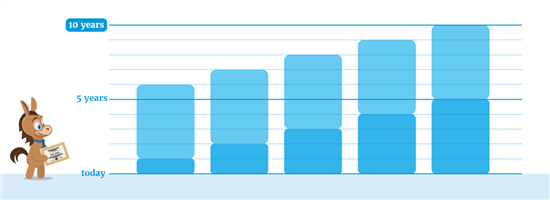 |
With CD ladders, your money is much more available than if you stashed all of it in a long-term CD.
Here's a quick and easy example. If you have $6,000 to invest, you can divide the funds equally into three CDs with different maturity dates:
Step 1: Open the CD
- $2,000 into a one-year CD with 0.25 percent APY
- $2,000 into a two-year CD with 0.40 percent APY
- $2,000 into a three-year CD with 0.55 percent APY
Step 2: Your CD matures
What happens after a CD matures? You have three options:
- Withdraw into your bank account
- Automatically renew into another CD of the same term (but at the prevailing interest rate, which could be lower or higher than what you had)
- Withdraw and choose another CD or another term or at another bank
In CD laddering, you reinvest each CD (and its interest) into a longer-term CD after the maturity date.
After the first CD matures after one year, you can choose to cash out or reinvest it into another three-year CD that offers a higher yield than a one-year CD. At this point, the other two CDs will be closer to their maturity dates. Just continue this process as long as you wish to maintain the CD ladder.
Note, you don't need to open all of your CDs with one financial institution. Keep an eye out for the best rates on each CD term.
CDs used to be a lot more popular back in the day. But now interest rates are pretty darn low. The biggest drawback to CD laddering is that you could be missing out on higher returns from more aggressive investments like stocks.
CDs are best for short-term investments. If you don't plan on using that money for several months or years, you might be better off with a brokerage account.
While CDs are safe and stable, you won't beat inflation. If you're a few decades from retirement, build wealth with brokerage accounts and save CDs for a portion of your portfolio.
Who is offering the best CD rates?
High-Yield CD Rates - Up to 4.00% APY
- No fees
- $1 minimum deposit
- FDIC insured
| Term | CD Rates |
|---|---|
| 2 Month | 4.00% APY |
| 3 Month | 4.00% APY |
| 4 Month | 4.00% APY |
| 5 Month | 3.40% APY |
| 6 Month | 3.50% APY |
| 9 Month | 3.40% APY |
| 12 Month | 3.30% APY |
CIT Bank No Penalty CD - 3.75% APY
- Option to withdraw full balance and interest after 7 days of CD funding date
- $1,000 minimum to open an account
- 11 months
- No monthly maintenance fee
- Member FDIC
CD Rates - Up to 3.75% APY
- $500 minimum opening deposit
- FDIC insured
| Term | CD Rates |
|---|---|
| 6 Month | 3.75% APY |
| 12 Month | 3.00% APY |
| 24 Month | 3.35% APY |
| 36 Month | 3.25% APY |
| 60 Month | 3.00% APY |
High-Yield CD - Up to $1,500 Bonus
- Select a savings offer and sign up: Choose and fund at least one high-yield savings account or CD on the Raisin platform to get started. Be sure to enter bonus code HEADSTART during sign-up to be eligible for a cash bonus.
- Deposit funds: The more you save, the more you can earn. Make a qualifying deposit(s) within 14 days of opening your account to set your bonus tier.
- Maintain your deposit(s): Maintain your deposit(s) for 90 days from your first deposit date to earn your bonus.
| Deposit | Cash Bonus |
|---|---|
| $10,000 - $24,999 | $70 |
| $25,000 - $49,999 | $175 |
| $50,000 - $99,999 | $350 |
| $100,000 - $199,999 | $750 |
| $200,000 or more | $1,500 |
Mission Valley Bank CD Rates - Up to 3.80% APY
- $1 minimum deposit
- No fees
- 24/7 online access to funds
- FDIC insured
| CD | APY |
|---|---|
| 3-Month No-Penalty CD | 3.80% APY |
Bottom line
Certificates of deposit offer security. You won't need to worry about losing money. If you don't have to access your money for several years, a long-term CD can get you a better return than a traditional savings account.
But CDs are unlikely to build wealth for the future. If you want to make real gains, consider taxable brokerage accounts with Ally Invest, Betterment, or Robinhood.
Amber Kong is a content specialist at CreditDonkey, a bank comparison and reviews website. Write to Amber Kong at amber.kong@creditdonkey.com. Follow us on Twitter and Facebook for our latest posts.
Note: This website is made possible through financial relationships with some of the products and services mentioned on this site. We may receive compensation if you shop through links in our content. You do not have to use our links, but you help support CreditDonkey if you do.
|
|
| ||||||
|
|
|













